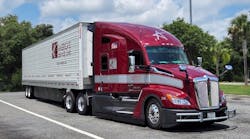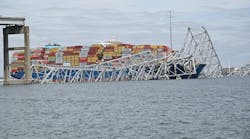WASHINGTON, DC. Some 50 organizations are conducting 100 plus meetings today on Capitol Hill to boost support for a Congressional bill that would allow states to increase the federal weight limit on interstate highways for commercial trucks to 97,000 lbs. That would be up from the 80,000-lb restriction put in place back in 1992.
“We’re getting greater momentum behind this legislation, from both a safety and fuel saving perspective,” John Runyan, executive director of the Coalition for Transportation Productivity (CTP), told FleetOwner.
“What we’re saying is that the challenge to putting safer yet more productive vehicles on our roadways is one created by policy, not by technology,” he said. “We’re also holding a briefing today to help show that safety will actually improve if give states the option to allow heavier vehicles to operate on the highways and off of secondary roads.”
CTP is also sponsoring a public briefing about what it believes are the potential benefits from making the Safe and Efficient Transportation Act (SETA) into law. The bill, re-introduced in the House of Representatives by Reps. Mike Michaud (D-ME) and Jean Schmidt (R-OH) as H.R. 763 last month, gives each state the option by raise its interstate weight limit for trucks equipped with an additional axle to a maximum of 97,000 lbs.
“Major trading partners such as Canada, Mexico and the European Union have already implemented higher truck weight limits, meaning that America is now at a productivity disadvantage,” stressed CTP’s Runyan. “Without SETA, the inefficiency we are experiencing will only worsen. It’s estimated that the trucking industry will haul 30% more tonnage in 2021 than it does today. If current weight restrictions remain the same, that means our economy will require 18% more trucks on the road driving 27% more miles than they do now.”
Lieutenant Thomas Kelly, commander-commercial vehicle enforcement for the Maine State Police, is one of the briefing’s speakers and plans to address the safety impact of a one-year pilot program that ended last December which allowed 100,000-lb., six-axle trucks on Maine’s interstates.
John Woodrooffe, head of vehicle safety analytics, University of Michigan’s Transportation Research Institute (UMTRI) will also speak and discuss the findings of several studies at the briefing that shows allowing heavier trucks on U.S. interstates would decrease the overall number of trucks required to haul the nation’s freight, thus reducing fuel consumption and improving safety.
“This is the rare occasion where concerns about the environment, fuel consumption and freight efficiency are all coming together at the same time,” he said last year during the “Moving the World: The Future of Freight Transportation” conference, hosted by Volvo Trucks North America (VTNA), Volvo Group North America, and the American Trucking Assns. (ATA) at the Swedish embassy in Washington D.C.
“At its heart the ‘more productive truck’ issue is about increasing the size and weight of commercial vehicles so fewer of them are needed to haul an expected doubling of freight volumes over the next quarter century,” he said.




